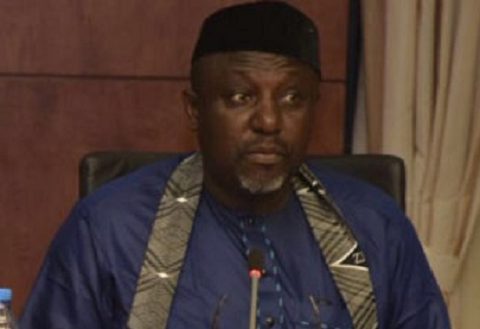
State of Emergency in Imo Judiciary – By Chinedu Nzeribe
–
The revelation on Monday, February 5, 2018, by Imo State immediate past Governor Ikedi Ohakim that judges in the state have not been paid a substantial part of their salaries and allowances in the last 16 months must have shocked every Nigerian. The Nigerian Bar Association (NBA) has even gone to court to compel Governor Rochas Okorocha to pay the honourable men and women of the Bench their arrears. In suit NICN/OW/58/2017 against the governor, the NBA branch chairman in Owerri, Lawrence Nwakaeti, demands from the National Industrial Court in the state capital: “A declaration that the practice whereby the respondents withhold or refuse to pay the sitting Judges of Imo State High Court and Judges of the Customary Court of Appeal that portion of their remuneration released to the respondents from the Consolidated Revenue Fund is a breach of oath of office of the 1st respondent as the Governor of Imo State who swore to preserve, protect and not to mutilate it”. Justice Opara has just died without being paid his entitlements in full.
Until Chief Ohakim brought the plight of judges in Imo State to the fore at a press conference, the Nigerian public was blissfully ignorant of the condition. This obviously owed to the circumscribing circumstances in which judges operate. They do not hold press conferences to state their grievances. They do not go to the streets to protest as the Nigeria Union of Teachers, the Nigeria Labour Congress and the Academic Staff Union of Universities (ASUU) are wont to do. They do not write open letters to the authorities to get them to address their concerns. Because of their professional ethics, they rather die in silence. It is tragic that some state governments in Nigeria capitalize on the extremely conservative nature of judicial officers to subject them to a dehumanizing condition.
But there are instances where one or two of judicial officers have swallowed the bullet by going public to call attention to the indignities they are subjected to by politicians. Justice Oloyede Folahanmi of the Osun State High Court in June, 2015, wrote a 30-page petition to the Economic and Financial Crimes Commission (EFCC) to investigate the management of the state’s finances under Governor Rauf Aregbesola who up to that time had not paid public servants, including judges, for seven months. The letter was copied to the Osun State House of Assembly so that it could start an impeachment process against the governor whom the honourable judge accused of turning Osun into a bankrupt and failed state.
While the nation got to know of the non-payment of Osun State judges when the salary arrears reached the seventh month, nonpayment in Imo State took a full year plus four months for Nigerians to know. Pray, what has the press been reporting? What could be more urgent or critical than owing judicial officers? How about civil society organizations? And the church and faith-based organizations like the Justice Development and Peace Commission? What have they been doing? It says a lot about our state that it has taken ex Governor Ohakim turning into an activist for the nation to become aware of the condition in Imo.
Why are members of the Bench owed? The state government has not offered any explanation yet, but it does not look as if it has to do with the parlous state of Imo government’s finances. True, the state government’s employees are owed in the state, despite the Federal Government’s payment on two occasions of the refund from the Paris Club’s debt relief and President Muhammadu Buhari’s payment in two tranches of bailouts to cash-strapped states like Imo. But the debt to the state workers has never been up to one year, let alone a whole 16 months. Unconfirmed reports suggest that the current state government is not happy with the judiciary for giving judgments against it on sundry issues.
The courts may have ruled against the Okorocha administration on various occasions, but the judiciary in the state is not yet truly an activist one. There are cases which are glaringly so bad that there is no way the state government can win them. If a large number of people are awarded humungous contracts by the state government and after several years the government refuses or fails to pay them and they go to court, will the government realistically expect the judges to rule against the creditors/petitioners or rely on a technical ground to deny them justice? The judiciary is a temple of justice, and it will be failing in its core mandate if it refuses to dispense justice without caring whose ox is gored.
The Imo State judiciary has a proud heritage and a great tradition. It has been led at different times by the likes of the late Justice Chukwudifu Oputa, who was to be nicknamed Socrates by his colleagues in the Supreme Court because his rulings and judgments, marked by erudition, great learning, knowledge, wisdom and courage, are comparable to those of Lord Denning, the jurist of all time who retired in the early 1980s as Master of the Rolls in the United Kingdom.
The courts remain the last hope of the people. Governor Okorocha has a responsibility to ensure that the judiciary retains its age-long independence, integrity and prestige. A situation where judges are owed entitlements for dispensing justice is indefensible. To force them to debase their sacred office through officially induced starvation, hunger, want and abject poverty is an abomination.
There is no justification for owing Imo State employees. How have the two Paris Club refunds and the two Federal Government-assisted bailouts been utilized? Besides, crude oil prices have climbed to about $70 per barrel, which means a lot of revenue into coffers of different Nigerian governments, including Imo State which gets additional revenue as an oil-producing state.
Though President Buhari has wondered in public how some governors manage to sleep when thousands of their workers and families go to bed hungry, the All Progressives Congress (APC), to which Okorocha belongs, has not deemed it fit to call Okorocha to order. As chairman of the APC Governors Forum, Okorocha has to get serious for once. He can borrow a leaf from neighbouring Anambra State where Governor Willie Obiano directed years ago that civil servants, teachers and other public service workers be paid their salaries and allowances every month before political office holders like state lawmakers, commissioners and the rest could get theirs. This is how people-oriented leaders act in public office. Public service is service above self.
If Governor Okorocha had a policy of paying civil servants before political office holders, the mess in the Imo State judiciary and elsewhere in the state would not have arisen. In the meantime, we plead with Okorocha, in God’s name, to clear the arrears of entitlements owed judges immediately. He must refrain forthwith from giving the impression that Imo is a perfect example of a failed and bankrupt state.
Since both the APC and the Peoples Democratic Party (PDP) have failed Imo State, Imo people now have to vote the All Progressives Grand Alliance (APGA) next year. After all, APGA won Imo in 2011, but Okorocha played Judas Iscariot by abandoning the platform that brought him to power. APGA has a solid record of robust service delivery. No wonder, the whole of the Southeast is embracing it with gusto.
Finally, kudos to ex Governor Ohakim for calling national attention to the state of emergency in the Imo State judiciary.





